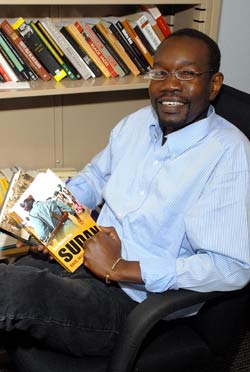| 07-19-2019, 09:43 PM |
Amir H. Idris
 Amir H. Idris Amir H. Idris
Registered: 08-31-2014
Total Posts: 11
|
|
 US should choose to help Sudan's protesters promote democracy BY AMIR IDRIS US should choose to help Sudan's protesters promote democracy BY AMIR IDRIS
|
10:43 PM July, 19 2019 Sudanese Online
Amir H. Idris-
My Library
Short URL
Despite warnings by the U.S. to protect peaceful demonstrations, the ruling Transitional Military Council (TMC) in Sudan fired live ammunition on June 30, killing seven and injuring nearly 200 protesters. It has been almost seven months since the start of SudanвҖҷs uprising, led by the Forces for Freedom and Change (FFC), which forced the army to intervene and declare the fall of Omar al-BashirвҖҷs 30-year regime in April 2019. Despite the pro-democracy forcesвҖҷ demand for a civilian-led government, the TMC continues to hold onto power through the use of brute force.
International and regional powers, including the United States and African Union, have been trying to mediate between the TMC and the FFC to reach agreement on a civilian-led government. The United States appointed retired ambassador Donald Booth as special envoy for Sudan.
On July 5, the ruling Transitional Military Council (TMC) and the Forces for Freedom and Change (FFC) reached a political deal for a power sharing, signaling the end of the standoff. However, the deal has not been signed by the two parties because the TMC demands immunity from prosecution for the violence against protesters and a veto power during the transitional period. The FFC and the protesters reject both demands.
SudanвҖҷs pro-democracy movement and the ruling military council signed a document early Wednesday that outlines a power-sharing deal, but the two sides are still at work on a more contentious constitutional agreement that would specify the division of powers. Without resolving the contentious issues, there is no reason to believe that the protestersвҖҷ demands will be achieved, and the power sharing deal will remain nothing more than a divisive strategy to quell the protesters and divert the attention of the international community.
The TMC has seemed unwilling to give up its power. Some TMC members, including Gen. Mohamed Hamdan Dagalo, leader of the Rapid Support Forces (RSF) and deputy head of the TMC, likely are worried about political and economic interests. The TMC also apparently protects some of the strategic interests of Saudi Arabia, the United Arab Emirates (UAE) and Egypt.
In the midst of these complex domestic and regional interests, the United States finds itself in a precarious position. Should the U.S. support the demands of the protesters for democratic reform in Sudan, or safeguard its regional geopolitical interests in the Red Sea regionШҹ In reality, Saudi Arabia, the UAE, Egypt and the U.S. share a common strategic position with regard to the fight against terrorism вҖ” in particular, the perceived threat of the Muslim Brotherhood and IranвҖҷs aggression. Similar to the experience in Egypt, their strategy appears to prefer вҖңstabilityвҖқ over what they call вҖңunorderlyвҖқ democratic transition.
Therefore, pro-democracy forces in Sudan are fighting on two fronts вҖ” not just the TMC and its allies from the deposed al-Bashir regime, but also those who apparently want to preserve the status quo, including keeping Sudanese troops in Yemen to support the Saudi-led coalition. SudanвҖҷs uprising does matter to the U.S. вҖ” for better or worse, the U.S. and other regional and international actors have a role to play in helping the transition to democracy succeed.
The people of Sudan have experienced the yoke of past undemocratic regimes that have used religion to oppress, impoverish and commit genocide for over 30 years. Indeed, they have genuine reasons not to allow a similar regime to be imposed upon them.
For that reason, the U.S. must conceive of a new, effective strategy for SudanвҖҷs transition, and value its own democratic ideals that a younger generation of men and women is aspiring to defend in Sudan. The fear of potential chaos should not guide strategic policy choices about SudanвҖҷs ongoing crisis. Unlike Syria and Libya, Sudan has a history of popular uprisings, which led to peaceful transitions to democracy in 1964 and 1985.
The current Sudanese uprising is a display of the political maturity and leadership of young women and men who have transcended their ethnic, religious and regional differences. Despite facing brutality, the protesters have refused to be provoked into violent armed rebellion.
The United States should encourage its allies in the region to change course and pressure the TMC to accept the demand of the Sudanese people for democratic rule. If that fails, the U.S. should impose sanctions on the TMC and its backers. Issuing statements of concern and urging the parties to resume talks, in the face of egregious human rights violations, is not enough and does not demonstrate the U.S. commitment to democracy and freedom around the world.
A successful democratic transition in Sudan would serve the national security interests of the United States in Sudan and the Horn of Africa. It would strengthen the ongoing democratic reforms in Ethiopia, consolidate the signed peace deal between Ethiopia and Eritrea, and energize the democratic forces in South Sudan to transition that country to a democratic state as well. The U.S. has a lot to win regionally by helping the Sudanese people to win their struggle.
Amir Idris is a professor and chair of the Department of African and African American Studies at Fordham University, New York.
|
|
   
|

|

|

|
|
|